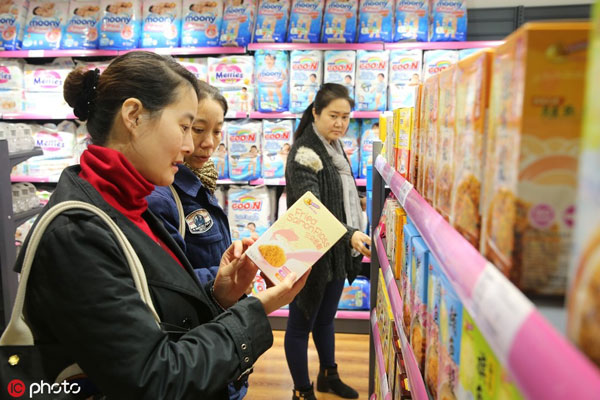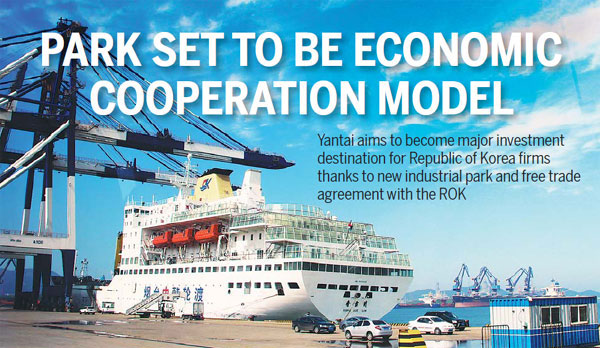Guideline to promote balanced development of foreign trade in Shandong

Shandong provincial government released a guideline on Dec 29, 2018, on promoting increases in imports and the balanced development of the province's foreign trade.
The guideline also suggests giving better play to the positive role of imports in upgrading people's consumption, accelerating the province's conversion of old and new growth drivers and enhancing its international competitiveness.
The guideline addresses five main issues: increasing imports of important commodities and optimizing the structure of imports, establishing and utilizing all kinds of import channels and platforms, optimizing the layout of the import market, increasing fiscal and financial supports, and improving the trade facilitation of imports.
Increasing imports of important commodities and optimizing the structure of imports
The guideline encourages Shandong province to increase imports of advanced technical equipment and key components related to the province's top 10 industries, with the aim of promoting the transformation and upgrading of those industries.
The top 10 industries in Shandong are new generation of information technology, high-end equipment, new energy and new materials, the modern oceans sector, healthcare, high-end chemical engineering, modern high-efficiency agriculture, cultural creativity, tourism, and modern financial services.
The guideline also supports increases in imports of products vital to people's lives to boost consumption upgrading. Tax reduction policies related to daily-use consumer goods should be implemented. Weihai is encouraged to build itself into a distribution center for Japanese and South Korean imported commodities to reduce purchase costs for consumers, while Qingdao, Jinan and Yantai will be supported to establish more duty-free shops to expand imports of duty-free goods.
Shandong will expand its imports of productive services which can support the development of its top 10 industries, including architectural design, commercial logistics, consultation services, research and development (R&D), energy conservation and environment protection, and environmental services. Services concerning finance, education, culture and medical treatment will also be increasingly imported. Weihai, as a pilot city for deepening innovation in service trade, should expand imports of high value-added and characteristic services that the province urgently needs.
The province will also promote increases in imports of resources and agricultural products, including crude oil, soybeans and farm machinery. It is also encouraged to build itself into an aquatic products processing and trade center to increase imports of aquatic products and the return of self-captured aquatic products and their processed products from ocean-going fisheries.

Establishing and utilizing all kinds of import channels and platforms
The guideline supports enterprises from Shandong province in carrying out procurement through the China International Import Expo. Subsidies and other incentives will be given to those enterprises which succeed in importing key technologies and advanced products according to national or provincial catalogues of those technologies and products.
Shandong will cultivate various kinds of trade fairs to expand sales of import commodities. Feasibility studies on holding sales exhibitions in cooperation with renowned foreign exhibition institutions will also be carried out to broaden import channels.
The province will give full play to ports stipulated in the approval documents of the Administration of Quality Supervision, Inspection and Quarantine (AQSIQ). Imports of general consumer goods, such as grain, fruit, seedlings, meat and chilled aquatic products, will be expanded. Cities where AQSIQ-stipulated ports are located should establish a regular notification system and improve one-stop services for inspection, customs declaration, cold-chain warehouse logistics and wholesale trade.
The guideline also encourages the national cross-border e-commerce comprehensive pilot zones (such as Qingdao and Weihai) to cooperate with domestic and international e-commerce platforms to expand imports through direct purchasing. It supports the provincial-level cross-border e-commerce comprehensive pilot zones (including Jinan, Yantai, Weifang and Rizhao) in the further development of public service platforms for cross-border e-commerce.
Qingdao, as a pilot zone for parallel importing of cars, should be used to form a complete automobile industrial chain, composed of international trade, warehouse logistics, exhibition and sales, after-sales maintenance, and financial insurance, to drive the import and export trade of automobiles and related industries.
Shandong will also take full advantage of the special areas under national customs surveillance. It encourages enterprises in the areas to develop the businesses in R&D and design, financial settlement, and testing and maintenance related to manufacturing, establish bonded warehouses, cultivate commodity trading platforms for cotton, rubber, plastics and paper pulp, as well as improve specialized services in bonded warehousing, trade logistics, sales exhibitions and supply chain finance.
The province will give full play to the leading role of foreign investment in expanding imports by implementing the Catalogue of Industries for Guiding Foreign Investment (Revision 2018) and relevant tax reduction policies, and improving the province's investment environment.
Deepening investment in foreign countries can also help to increase the province's imports, the guideline says. Shandong supports enterprises in the region in the cooperative development of overseas resources, and in the establishment of overseas marketing networks, warehouses and trade logistics parks to promote the province's imports of resource products, such as wood.

Optimizing the layout of the import market
Shandong will increase imports from countries involved in the Belt and Road Initiative (BRI). It will accelerate the construction of the demonstration zone in Qingdao for the Shanghai Cooperation Organization to explore new models for regional economic and trade cooperation among BRI countries. It also encourages enterprises to develop and import advantageous resources from the Middle East, Central Asia, Mongolia and Russia, including crude oil, coal, natural gas, iron ore and non-ferrous metals.
By improving the efficiency of the China-European freight trains and cooperating with Japan, South Korea, Central Asia and Europe in logistics and ports, Shandong will further develop carrying trade and transit trade.
The province will keep expanding imports by giving full play to the China-South Korea Free Trade Zone in Weihai and the Sino-ROK Industrial Park in Yantai, accelerating the establishment of infrastructure (covering railways, ports and airports) in Yantai and Weihai, increasing the density of container marine lines and passenger-cargo liner routes to South Korea, and making full use of cross-border e-commerce and international logistics.
Increasing fiscal and financial supports
Shandong will increase its fiscal support to increase imports, including an interest discount for key imported technologies and products, and reducing or exempting customs duty for some imported equipment and commodities.
The province will also increase its financial supports. It encourages financial institutions to increase their credit support for import businesses by making use of refinancing and rediscounting, as well as enterprises to carry out cross-border renminbi import settlements.

Improving the trade facilitation of imports
The guideline proposes that Shandong should optimize the process and reduce the cost of import customs clearances, such as cutting import licensing procedures and compressing the licensing time to two working days. It is expected that by the end of 2021, the overall customs clearance time will be cut to half of what it was in 2017, and by the end of 2020, the compliance cost of container imports and exports will be reduced by half compared with that in 2017.
Measures will be taken to promote the application of the single-window system for international trade in Shandong, in which cross-border traders can submit regulatory documents at one location. The establishment of intelligent ports in the region will be sped up to promote conversion to electronic bills of lading of imported containers and equipment handovers.
The guideline also requires Shandong to strengthen supervision of port charges, and normalize charges in imports and exports.
Shandong will keep improving public services for imports in the aspects of information, policies, talents, financing, testing and certification, risk warning, and legal assistance. The foreign trade credit system will also be strengthened to crack down on imports of counterfeit and shoddy goods, and the infringement of intellectual property rights, and to regulate market order and maintain fair competition.
The guideline encourages relevant chambers of commerce, guilds and cross-border e-commerce associations to provide import consulting and training services according to actual demand, strengthen communication and cooperation, and set up business information exchanges and service platforms.
This English version is only for reference. To learn more, please refer to the authoritative Chinese version on Shandong.gov.cn.
MOST POPULAR
- 1 China Daily's 'Shopping in China' platform appeals to intl audiences
- 2 China updates Catalogue of Encouraged Industries for Foreign Investment
- 3 Policies concerning expats, foreign enterprises in December 2025
- 4 China becomes the world's fourth manufacturing power
- 5 China ascends global higher education ranking







